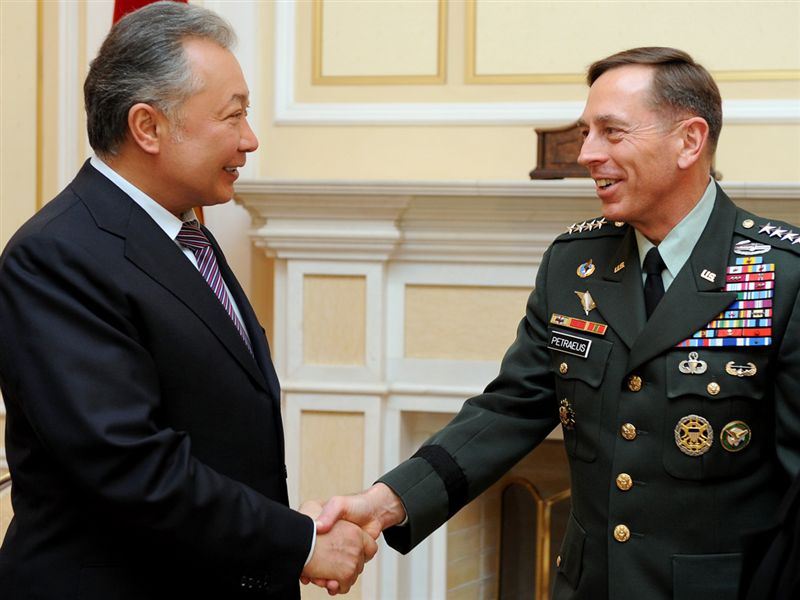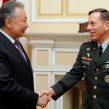
US Assists Kyrgyzstan in Constructing Anti-Terrorist Center in Batken
Publication: Eurasia Daily Monitor Volume: 7 Issue: 48
By:

During his visit to Bishkek on March 10, the Commander of the United States Central Command (CENTCOM), General David Petraeus, reiterated that by helping to build an anti-terrorist center in Batken city, Washington does not seek to open an additional military base. The Kyrgyz President, Kurmanbek Bakiyev, in turn, argued that most security challenges to Kyrgyzstan stem from Afghanistan and that his regime needs to be better prepared to resist terrorism (Times of Central Asia, March 10). The US government will invest $5.5 to build the center and construction work will begin next year (www.korrespondent.net, March 9).
Apart from his international meetings, President Bakiyev rarely mentions Afghanistan’s role in national security. Rather, different views about potential threats permeate Kyrgyzstan’s military and political officials. Thus far, little is known about the real interests among Kyrgyz military officials who were negotiating with CENTCOM. However, the evidence suggests that some key military leaders see the new Batken anti-terrorist center’s future role as the principal deterrent against possible aggression emerging from Uzbekistan.
As one representative of the Kyrgyz defense ministry told Jamestown, military officials in Bishkek hope to maintain a military battalion in the southern part of the country to respond to “local conflicts.” The terminology assumes that such conflicts would be initiated by Uzbek troops. There is a widely held view among the Kyrgyz military that Tashkent is developing its military forces with the aim of one day acquiring Kyrgyzstan’s water reservoirs and protecting the ethnic Uzbek population living in Osh and Batken by military means.
Training at the Batken anti-terrorist center will be conducted under the auspices of the International Military Education and Training (IMET) program. IMET programs have already been widely implemented in Kyrgyzstan, including in Tokmok city, where similar training facilities were built. The anti-terrorist center will include advanced medical facilities that have no equivalent in the entire region (www.msn.kg, February 26).
The base is planned to be positioned in a unique part of the Batken area, where the risk of attacks from the air or over land are minimal. Overall, the new military training center will represent the Kyrgyz regime’s continued strategy of strengthening its southern borders by building up its military strength. Negotiations on the construction of the center began in August 2008. One year later, the Kyrgyz and US sides reached an agreement on most issues. Reportedly, Bakiyev’s maneuvering with the US military base at Manas, when he first demanded its withdrawal and then changed his mind, did not affect the final negotiations. The initiative to construct the center mainly came from the Kyrgyz side.
Kyrgyz military officials realize that the center would in many cases serve an important role for the country’s security compared to the prospective Russian airbase in Osh. The Russian base is planned to be constructed within the Collective Security Treaty Organization (CSTO) framework and will mostly host Russian personnel. The Batken center will include special training facilities for the anti-terrorist battalion “Skorpion.” It will train specialists to analyze tendencies within terrorism in the Central Asian region. Kyrgyzstan clearly lacks such experts today, and the current Defense Minister, Bakytbek Kalyev, has been pushing for the construction of a special think-tank that would provide cutting-edge analysis on such trends in the Ferghana Valley and beyond.
The prospect that a new class of military and civilian personnel would be trained with the help of US government is another element that interests the Kyrgyz government. So far, US-trained Kyrgyz military personnel have been leaving the military upon returning to service from IMET courses in the United States. Most graduates were frustrated with how the skills they acquired turned out to be largely irrelevant and unappreciated in Kyrgyzstan’s military. “The center will generate a critical mass of US-trained officers,” one Kyrgyz defense ministry representative told Jamestown.
Although most Russian media see the new military center as yet another geopolitical move on the part of Washington, it is important to note that the initiative to build the facility stemmed from the Kyrgyz side (www.gazeta.ru, March 9). The official reason underlying the need for the new center is rooted in the terrorist threat emanating from Afghanistan, and differs from an unofficial viewpoint that suggests the Kyrgyz elites want to militarily protect the southern part of the country more from their neighbor.




